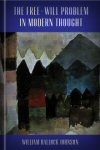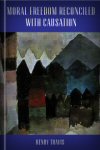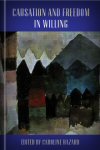Classic Studies on the Philosophy of Free Will (7 vols.)
Digital Logos Edition
Overview
The subject of free will remains one of the most fertile grounds for debate in fields from psychology and biology to theology and philosophy. This collection gathers a variety of classic resources from the nineteenth and early twentieth centuries discussing various aspects of determinism and free will.
See how beliefs about self and society impact our perceptions of decision-making. Study how views of determinism affect theology, psychology, and politics. See how everyone from ethical evolutionists and traditional theologians have explained free will, and access examinations of how great minds have wrestled with this problem.
In the digital edition, Classic Studies on the Philosophy of Free Will is enhanced by amazing functionality. Important terms link to dictionaries, encyclopedias, and a wealth of other resources in your digital library. Perform powerful searches to find exactly what you’re looking for. Take the discussion with you using tablet and mobile apps. With Logos, the most efficient and comprehensive research tools are in one place, so you get the most out of your study.
Looking for more classics studies? Check out Classic Studies on the Problem of Good and Evil (6 vols.).

Key Features
- Surveys the work of great English philosophers and their impact on free will philosophy
- Explores the perspectives of psychologists, scientists, theologians, and philosophers
- Provides a window into enlightenment-era thought on free will and determinism
Product Details
- Title: Classic Studies on the Philosophy of Free Will
- Volumes: 7
- Pages: 1,765
- Resource Type: Monographs
- Topic: Moral Philosophy
Individual Titles
- Free-Will and Four English Philosophers: Hobbes, Locke, Hume, and Mill by Joseph Rickaby
- The Free-Will Problem in Modern Thought by William Hallock Johnson
- Moral Freedom Reconciled with Causation by Henry Travis
- Free-will and Law in Perfect Harmony by Henry Travis
- Freedom and Liberty by William Benett
- Religion and Free Will: A Contribution to the Philosophy of Values by William Benett
- Causation and Freedom in Willing by Rowland G. Hazard

The four great philosophers in this survey have indelibly shaped Western conceptions of self, state, and society. This volume examines what the modern emphasis on freedom says about what we think of free will, especially as it pertains to religion. Joseph Rickaby provides ample quotes from each philosopher, followed by his own analysis.
Joseph Rickaby (1845–1932), ordained in 1877, was professor of logic and general metaphysics at St. Mary’s Hall, Stonyhurst College. His works include Scholaticism, An Index to the Works of John Henry Cardinal Newman, and Moral Philosophy: Ethics, Deontology and Natural Law.

William Hallock Johnson’s The Free-Will Problem in Modern Thought examines the psychological, biological, political, ethical, and theological dimensions of various free will arguments. Originally published in 1903—when many scientists and psychologists began to assert that free will was an illusion—Johnson points out the shortcomings of these pronouncements. Johnson’s work in this evergreen debate provides an excellent survey of the most important modern thoughts on free will.
William Hallock Johnson (1865–1949) was Avery Professor of Greek and later president of Lincoln University.

Henry Travis’ work on free will is born out of decades of wrestling with the problem of causation. Thoroughly researched and intelligently presented, Travis’ work calls the reader to think through his or her own experiences. This work is a valuable window into the mind of an intellectual during the Enlightenment, and is full of human commentary.
Henry Travis was a nineteenth-century philosopher and medical doctor. He is also the author of A Manual of Social Science for the Working Classes.

In this later work, doctor and philosopher Henry Travis discusses the nature of moral freedom and restriction. Travis argues that, far from being the absence of all restriction, real moral freedom is created by forming a will strong enough to fight against fleeting passions. A substantive discussion of nineteenth-century philosophy, Travis’ work is also full of engaging human reflection.
Henry Travis was a nineteenth-century philosopher and medical doctor. He is also the author of A Manual of Social Science for the Working Classes.

In this broad text, William Benett discusses the ultimate end of philosophy and the relationship between biological drives and human liberty. This volume is an excellent window into the thoughts of ethical evolutionists in the early twentieth century.
William Benett was an early twentieth century philosopher. He is also the author of The Ethical Aspects of Evolution and Justice and Happiness.

In this volume, William Benett discusses the definition of religion, its effect on human behavior, and the problem of determinism. Benett focuses on the theological shift of primarily believing in religious determinism to believing in free will, and what it means for religious, political, and social practices.
William Benett was an early twentieth century philosopher. He is also the author of The Ethical Aspects of Evolution and Justice and Happiness.

This volume begins with two letters from John Stuart Mill, regarding his disagreement with author Rowland G. Hazard. Hazard argues that we are “animals, not automata,” capable of creativity and possessing free will. This engaging work clearly presents compelling arguments for and against human free will.
Rowland G. Hazard (1801–1888) was an American industrialist, politician, and social reformer. He was active in the American abolitionist movement, served in Rhode Island state government, and was a founding member of the Republican Party. He wrote widely on philosophy, economics, and politics.
Reviews
2 ratings

Dustin Payne
2/26/2021
Prophet_kevin
4/1/2016